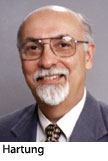With Dr. Bruce Hartung
Q: Our pastor is encouraging our congregation to change its constitution so that we can have a completely new style of governing structure.
Some of us are concerned that it is too much of a departure from our traditional way of doing things and may even be unbiblical. We also fear that the pastor will become a CEO instead of a shepherd, and that he will not have time to concentrate on Word and Sacrament ministry.
Could you offer us any advice concerning this matter?
A: Let me begin with a word from the LCMS Commission on Theology and Ch urch Relations, which might be helpful:
urch Relations, which might be helpful:
“Congregational polity is an adiaphoron, neither commanded nor forbidden in Holy Scripture. The New Testament is not an encyclopedia that answers all possible questions. One cannot expect these ancient documents to address the polity questions that arise 2,000 years later. In fact, the New Testament does not give any mandates regarding the polity of a congregation or Synod. How a congregation sets up its daily working arrangements and organizational structure is left to the discretion of human reason and sanctified common sense. How many committees it has and how each committee operates are matters that belong to the area of Christian freedom.
“ … A key question is this: What type of polity and organizational structure will support and reinforce doctrine and practice as taught by the Scriptures?” (“Appendix B, The Service of Women in Congregational Offices of Executive Director/President or Assistant Director/Vice President,” The Service of Women in Congregational and Synodical Offices, CTCR, January 2005, p. 28).
Thus, in one clear sense there is no organization of the congregation that is scripturally commended. This could very well mean that congregations might organize themselves in whatever way best serves their ministry.
In other words, it is a congregation’s choice whether there is a president, executive director, voters assembly, board of elders, or board of directors.
And, likely, there are organizational structures and ideas from the so-called business community that might be helpful. In fact, I would encourage congregations and other church organizations to consider helpful models and suggestions from the secular world. But through it all, such secular models must be disciplined according to the Scriptures.
We in the church all wear a theological or scriptural lens through which we look. I believe that all organizational polity must meet the test of spiritual discipline and proclamation of the Gospel.
Whatever your congregation is considering organizationally might very well be a departure from tradition. However, it is difficult to see what specific part of a governing structure is unbiblical unless it fosters a departure from biblical doctrines.
In the end, what is your overriding concern?
It appears to me that you want to protect the Office of the Holy Ministry. You want your pastor to remain the “shepherd” of the flock, the public minister of Word and Sacrament.
If that is your intent, congregational polity needs to be developed to help that happen. It should answer the question, “How will this polity help us be more faithful proclaimers of the Gospel and evangelists to the world around us?”
New forms and structures might very well be indicated. But they should enable a clear proclamation of the Gospel.
To quote a colleague of mine on this issue, “No structure is perfect, because sinners serve in it. We are free to try new structures and even to fail, because of the Gospel which brings us forgiveness, confident that the future of the church is ultimately in the capable hands of our Risen Savior.”
Rev. Bruce M. Hartung, Ph.D., is dean of Ministerial Formation for Concordia Seminary, St. Louis. He can be reached at hartungb@csl.edu.
Posted Nov. 1, 2007



